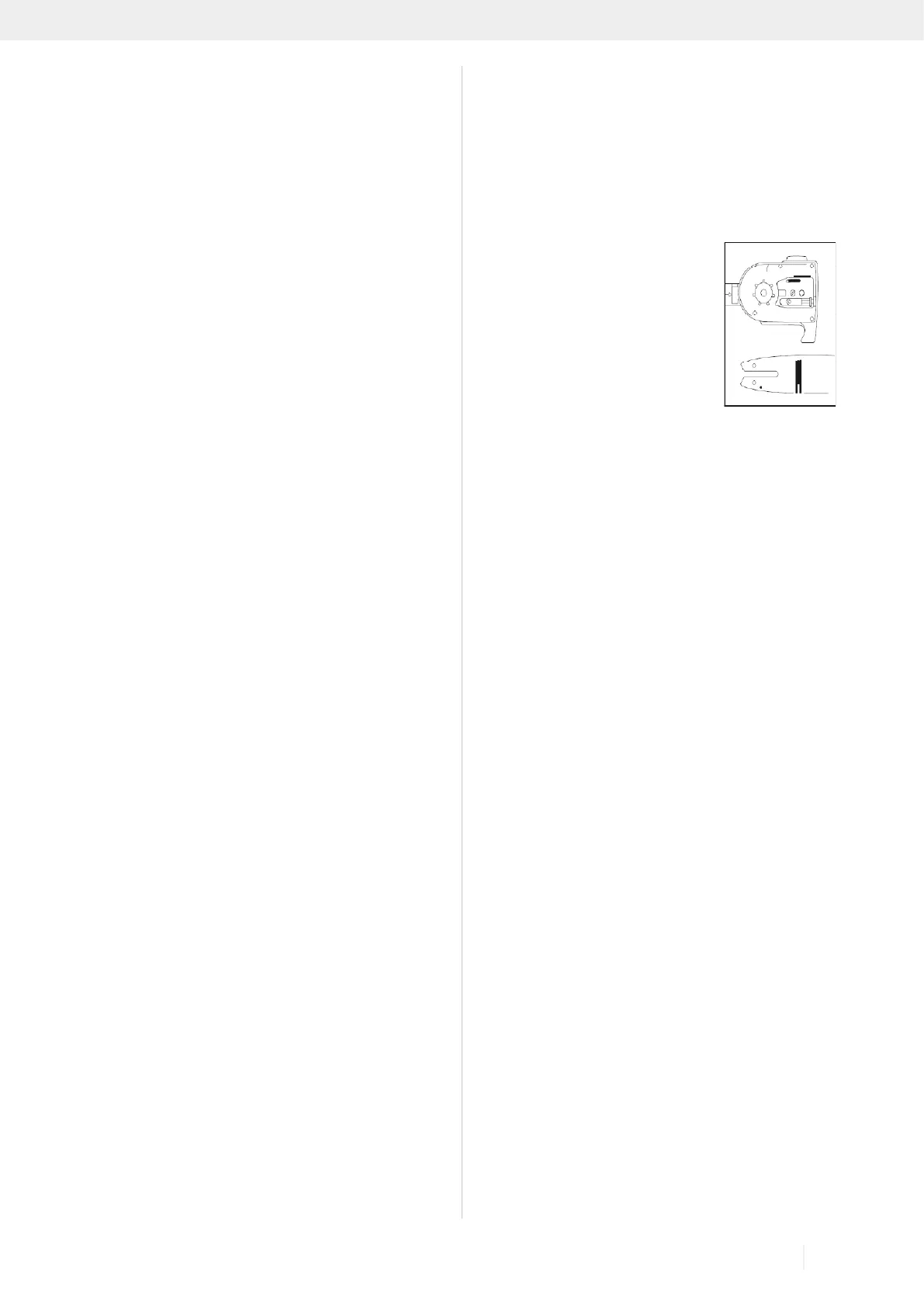39GB
m Warning!
Never run the engine without the air lter ele-
ment installed.
Care of the guide rail
Turn the rail around every time you have the chain
sharpened or replaced. This will avoid a one-sided
wear of the rail, especially at the top and bottom.
Regularly clean
1 = the opening for the oil supply
2 = the oil passage
3 = the raceway groove of the rai
Servicing and sharpening of saw chain
The correct sharpened chain
Working effectively with the chainsaw is only possi-
ble if the chain is in good condition and sharp. This
also reduces the risk of kickback. The chain can be
re-sharpened by any dealer. Do not attempt to sharp-
en the chain yourself unless you have the necessary
special tools and experience. A properly sharpened
chain goes way through the wood and it requires
very little pressure. Do not work with a dull or dam-
aged chain. It increases physical exertion, increase
the vibrations and leads to unsatisfactory results and
higher wear.
• Clean the chain.
• Check it.
• Replace damaged or worn parts with matching
spare parts they are in the shape and size of the
original parts as necessary.
• Sharpening a chain should be performed only by
experienced users!
Notice. Below the angle and dimensions If the
chain is not properly sharpened or the depth is too
small, there is a higher risk of reversion effects and
resulting injuries! The chain cannot be xed on the
guide rail. It is therefore best to remove the chain
from the rail and then sharpen.
• Select the appropriate tools for the chain pitch
sharpening tool. See "Specications" for the al-
lowed chain pitches.
The chain pitch (for example 3/8 ") is highlighted in
the depth of each blade.
Use only special les for chain saws! Other les have
the wrong shape and the wrong cut.
Select the le according to the diameter of your chain
pitch. Make sure to observe the following angle when
sharpening the chain diameter.
3
2
1
• Sharpen the blade with a at le and make sure
that the angle of the cutting edge is not altered in
the process. (~25°) File in one direction only.
• Replace the blade at the latest after ve times
scharpening.
Replace the blade with heavy wear or broken blade.
Unbalanced blades will cause the brush cutter to vi-
brate violently-risk of accident!
Lubricate angle transmission, Brush cutter
Fig. 8 (O)
Lubricate with lithium-based grease. Remove the
screw Fig. 8 (O) and put in the grease, turning the
shaft manually until grease emerges, then replace
the screw.
Attention! Fill only a small amount of grease. Do not
overll.
Change and clean the spark plug Fig. 30-31
Check the spark plug air gap at least once a year or
when the engine starts poorly. The correct gap be-
tween ignition ag and ignition contact is 0.25"/0.63
mm.
• Wait until the engine has cooled down completely.
• Pull the spark plug cap off the spark plug, and
use the supplied spark plug wrench to remove the
spark plug by turning.
• When the electrode is severely worn out or reveals
a strong incrustation, the spark plug must be re-
placed with an equivalent plug.
• A strong incrustation of the spark plug can be
caused by: Amount of oil is too high in the gasoline
mix, poor oil quality, old gasoline mix, or plugged
up air lter.
• Screw the spark plug by hand completely into the
thread. (Avoid jamming it)
• Use the supplied spark plug wrench to tighten the
spark plug.
• When using a torque wrench, the tightening torque
is 12-15 Nm.
• Plug the spark plug socket correctly on the plug.
Clean the air lter Fig. 32-35
Soiled air lters reduce the engine power by sup-
plying too little air to the carburetor. Dust and pollen
plug up the pores of the lter made of foamed plastic.
Regular checks are therefore essential.
• Unclip the air lter cover and remove the sponge
lter element.
• To avoid objects falling into the air tank, replace
the air lter cover.
• Wash the lter element in warm soap water, rinse
and allow drying naturally.
Important: Never clean the air lter with petrol or
inammable solvents.
In order not to shorten the service life of the engine,
a damaged air lter must be replaced at once.
